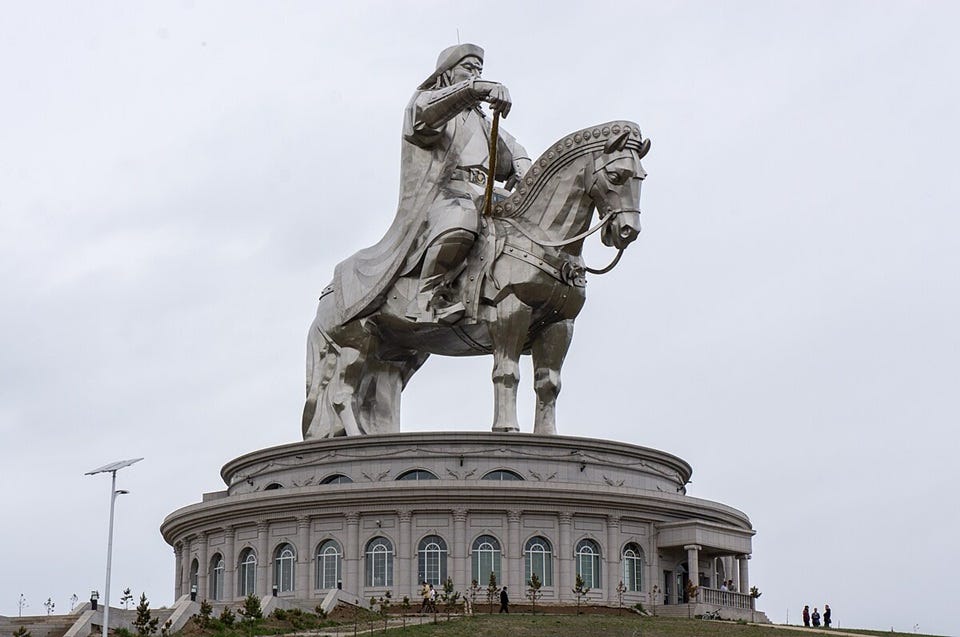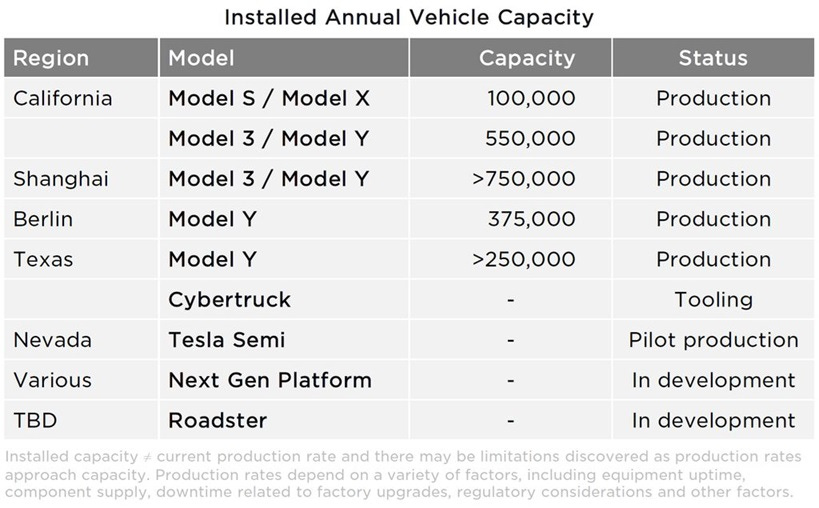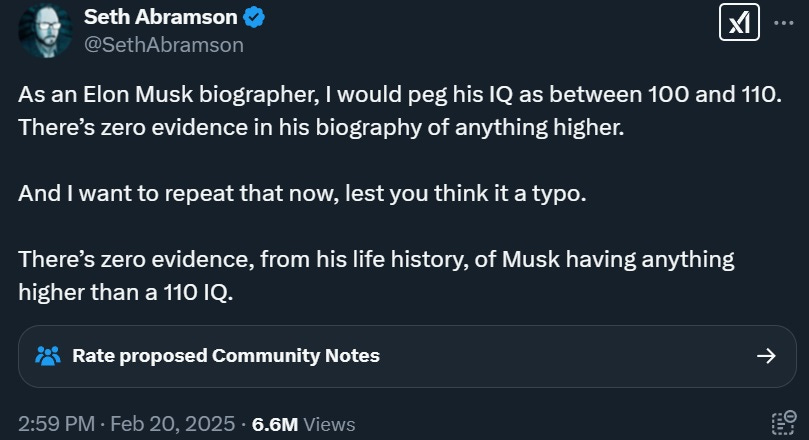|
 |
I’m writing a longer post, but it’s taking two days, so in the meantime, here is one of the more absurd statements I’ve seen recently:
This statement is wrong, of course. According to biographer Walter Isaacson, Elon got a 1400 on the SAT in the late 1980s, on his second try. SAT scores and IQ are highly correlated, and according to all the sources I can find, an SAT of 1400 at that time would have roughly corresponded to an IQ of in the mid-130s. Elon also has a bachelor’s degree in physics and was accepted to a materials science PhD program in the 90s. He is a man of well above average intellect.
But that’s not why Abramson’s statement is so absurd. The reason it’s absurd is not its content but its purpose — it represents an attempt to diminish the country’s fear of Elon Musk and his role in American politics by calling him stupid. This is a very foolish thing to try to do.
First of all, IQ is not a great measure of competence at the kind of things Elon is best at — building and improving organizations, identifying talent, managing large numbers of people, fundraising, creating and communicating a vision for the future, and so on. Keuschnigg et al. (2023) find that IQ tends to plateau at high levels of wealth:
We draw on Swedish register data containing measures of cognitive ability and labour-market success for 59,000 men who took a compulsory military conscription test. Strikingly, we find that the relationship between ability and wage is strong overall, yet above €60,000 per year ability plateaus at a modest level of +1 standard deviation. The top 1 per cent even score slightly worse on cognitive ability than those in the income strata right below them.
In the past, Americans recognized the importance of abilities that can’t be measured on a test — real-world business acumen was generally revered over book learning. But as knowledge industries grew in importance and the highly educated professional class rose in power and prominence, the country began to worship at the altar of raw intellect. Even many Americans who, if you put them on the spot, would swear up and down that IQ is a racist and meaningless concept will resort almost instantly to calling people “idiots” or talking about their low IQ in a social media fight.
And yet whatever his IQ is, Elon has unquestionably accomplished incredible feats of organization-building in his career. This is from a post I wrote about Musk back in October, in which I described entrepreneurialism as a kind of superpower:
Even as American manufacturing (and German manufacturing, and Japanese manufacturing, etc.) has been hollowed out by Chinese competition and our great old companies have stumbled and declined, one single entrepreneur has been able to build and scale gigantic new cutting-edge high-tech world-beating manufacturing companies in the United States of America. That one man is Elon Musk.
Consider SpaceX. Without this one Musk company, America would be lagging far behind China in the space race. But with SpaceX included, the U.S. is far ahead of China…And SpaceX is a manufacturing powerhouse. Despite doing almost all of its manufacturing in the United States, the company has been able to outmanufacture all of China in its field…SpaceX has already launched so many Starlink communication satellites into low Earth orbit that Musk’s constellation [of satellites] now outnumbers all other active satellites and spacecraft combined…
It’s not as if other businesspeople haven’t tried their hands at space. Jeff Bezos, creator of the world’s premier e-commerce site and the world’s top cloud computing network, founded Blue Origin, a SpaceX competitor, but it lags far behind…
But SpaceX is neither a fluke nor a special case. Despite a recent modest increase in competition, Tesla still utterly dominates the market for electric vehicles in the U.S…And when Elon recently set up a cluster of GPUs to train his new AI model, it was done far faster than Nvidia CEO Jensen Huang believed possible[.]
As an industrialist, Elon is unmatched by any American in the country’s entire history — Henry Ford, his closest competitor for the title, failed in the aerospace industry.
Seth Abramson could not build SpaceX, or Tesla, or any of the things Musk has built, no matter how much money someone handed him. Neither could I, dear reader, and neither could you. Neither, I think, could Terence Tao, or any of the other highest-IQ supergenius mathematicians on the planet.¹ Any of us could spend a lifetime and burn a trillion dollars and probably not end up with anything remotely resembling Musk’s high-tech industrial behemoths.
Why would we fail? Even with zero institutional constraints in our way, we would fail to identify the best managers and the best engineers. Even when we did find them, we’d often fail to convince them to come work for us — and even if they did, we might not be able to inspire them to work incredibly hard, week in and week out. We’d also often fail to elevate and promote the best workers and give them more authority and responsibilities, or ruthlessly fire the low performers. We’d fail to raise tens of billions of dollars at favorable rates to fund our companies. We’d fail to negotiate government contracts and create buzz for consumer products. And so on.
And there are probably lots of other, less obvious things that Musk does that we would fail to do:
A key driver of [Musk’s] success is a relentless focus on solving problems fast, often by working directly with the engineers or coders who've gotten stuck, Marc Andreessen says…The legendary venture capitalist shared his insights from working closely with Musk on X, xAI, and SpaceX…Unlike many CEOs, Musk is devoted to understanding every aspect of his businesses, the Andreessen Horowitz cofounder and general partner said. He's "in the trenches and talking directly to the people who do the work," and acting as the "lead problem solver in the organization."
I’ve been watching Elon succeed at building seemingly impossible companies and driving them to new heights of success for over a decade. And at every turn, there were hecklers on social media calling him an idiot, a fraud, and a huckster, and claiming that his companies were about to collapse and die. Although Elon didn’t deliver on every promise he ever made, again and again he has made his hecklers eat their words.
And Elon did this in spite of the entire apparatus of American proceduralism and anti-development policy being against what he was trying to do. It’s famously difficult to build factories in America, thanks to land acquisition costs, procedural barriers like NEPA, regulation, high labor costs, and so on. And yet as of 2023, Tesla produced more cars in America than it did in China:
 |
California is famously one of the hardest states to build in, and yet SpaceX makes most of its rockets — so much better than anything the Chinese can build — in California, almost singlehandedly reviving the Los Angeles region’s aerospace industry. And when Elon wanted to set up a data center for his new AI company xAI — a process that usually takes several years — he reportedly did it in 19 days.
Contra Nate Silver, none of this really has much to do with Elon’s IQ.
Part of the reason some progressives still insist on sneering at Elon’s intellect is the traditional class resentment of the shabby educated elite for the wealthy titans of industry. But I think a lot more of it is simply what the kids call “cope”. Right now, Elon is applying all of the same talents he used to build his companies — motivating employees, circumventing red tape, identifying and overwhelming every bottleneck at breakneck speed — to his effort to remake the U.S. civil service with DOGE. Telling themselves that Elon doesn’t really have any talent, or that he just gets lucky, or that he’s just a huckster, or that he only succeeds because of government help, are ways that progressives comfort themselves with the belief that Elon’s efforts will inevitably fail.
Another way that some people have coped with Elon’s blitz is to stubbornly insist that history is moved not by “great men”, but by slow and inexorable forces:
